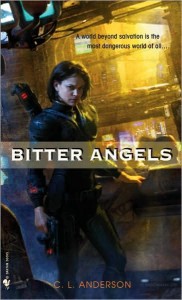 Over three decades ago, Terese Drajeske retired from the Guardians, and from the business of preventing war from threatening Earth and its far-flung colonies. The last thing she ever expected or wanted was to be recalled to active duty, but the brutal murder of her old friend and mentor is something even she can’t ignore. Reluctantly, she accepts her assignment: travel to the corrupt and dangerous Erasmus System, a set of worlds where slavery, smuggling, abuse of power and treachery run rampant, and find out if a true threat to humanity’s peace exists.
Over three decades ago, Terese Drajeske retired from the Guardians, and from the business of preventing war from threatening Earth and its far-flung colonies. The last thing she ever expected or wanted was to be recalled to active duty, but the brutal murder of her old friend and mentor is something even she can’t ignore. Reluctantly, she accepts her assignment: travel to the corrupt and dangerous Erasmus System, a set of worlds where slavery, smuggling, abuse of power and treachery run rampant, and find out if a true threat to humanity’s peace exists.
What she discovers is far worse than she expected, with the powerful Blood Family holding entire worlds in an implacable stranglehold, and the omnipresent Clerks monitoring every word and action for signs of rebellion or independence, with slavery and smuggling operations operating under the surface and desperation driving good people to do bad things. There’s an undercurrent of paranoia and suspicion, and something is very, very wrong in the Erasmus System. Will Terese be its savior, or just another victim?
She’s not alone. Others are caught up in the complex set of betrayals and manipulation, including Captain Amerand Jireu and Doctor Emiliya Varus, natives of the Erasmus System who are all too familiar with its darkest aspects. Forced to go to extremes in order to survive and succeed, they become both pawns and queens in a decades-old plot that’s nearing fruition. With the fate of several worlds at stake, who will live, who will die, and who will give in to temptation?
Bitter Angels is the latest offering from Sarah Zettel, though now writing as C.L. Anderson, and it marks her first science fiction novel in eight years. It’s a strong return, featuring a complex and intriguing plotline and a varied cast of memorable characters, thrown into a dark and dangerous setting. It’s apparent that Anderson has a clear vision of her universe, so even though we only see bits and pieces in this book, we can get a fairly good impression of the bigger picture. From technological advances to social developments to economic theory, she has put a lot of work into a believable, somewhat disturbing future that’s both utopian and dystopian. The storyline sucked me in, and kept me reading as I tried to figure out what was true and what wasn’t, and just what sort of game was being played behind the scenes. It’s by no means a comforting sort of story; it’s ambitious and thoughtful. While at times it’s hard to remember who’s doing what to whom, and certain aspects of the ending don’t really ring true to me, Bitter Angels is otherwise a rather enjoyable book. I hope we’ll get to see more in this universe, as I think there’s a lot of potential in the groundwork laid here.
